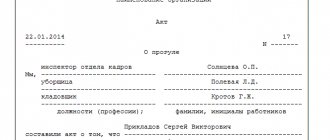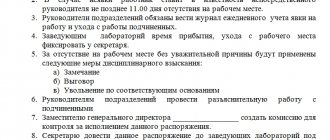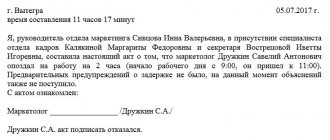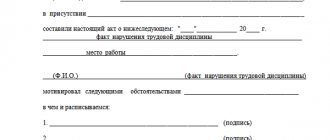Any employer requires that employees at the workplace obey certain rules. Labor efficiency largely depends on compliance. In addition, the team must maintain an appropriate working atmosphere. As practice shows, only labor discipline helps to achieve this.
Its main provisions are regulated by the Labor Code, as well as internal regulations of the organization. Before employment, an employee must be familiarized with the specifics of discipline in the workplace, as well as the penalties for violating it. If in a particular situation no special punishments are provided, the penalty is determined by the norms of the Labor Code of the Russian Federation. Let's talk in more detail about what labor discipline is and what penalties are provided for its violation.
Types of labor discipline violations
Labor discipline is an approved set of rules of conduct that are mandatory for all employees of the enterprise, including management, that are adopted by the employing company (in particular, labor protection rules, internal regulations, corporate ethics, etc.). The employer must not only develop and approve a list of rules, but also ensure their proper implementation.
Each enterprise must have its own local internal regulations (in accordance with Part 4 of Art.
189 Labor Code of the Russian Federation). This document serves as instructions for employees of the enterprise and contains all the nuances of the labor process and the specifics of labor discipline at a particular employer.
In particular, it should contain the start time of the working day in the company, the procedure for assigning and depriving bonuses, requirements for maintaining trade secrets and the information that forms it.
This is important to know: Who is eligible for a free social worker?
Any violation of labor discipline threatens the employee with disciplinary action.
Each employee must sign and familiarize himself with the current internal regulations during employment or when they change during the work process. If the specified procedure is not followed, then it is not allowed to bring the employee to disciplinary action for violation of labor discipline.
According to the Labor Code of the Russian Federation, an employee’s responsibilities include fulfilling the labor standards established by the enterprise, as well as:
- conscientious performance of assigned duties;
- compliance with labor protection rules and internal regulations;
- compliance with the Regulations on Trade Secrets and the requirements of other documents in force at the enterprise;
- careful handling of company property;
- immediate notification of management about a threat to the life and health of other employees , the safety of the enterprise’s property, etc.
Violation by employees of their duties from the above list can be considered a violation of labor discipline.
Depending on the labor process standards that were violated, the following types of non-compliance with labor discipline are distinguished:
- Violation of current technological standards.
- Violation of subordination and coordination in personnel management , i.e. violation of management norms.
- Violation of the regime (in relation to the established rest time and working day).
Thus, the release of defective products due to the fault of an employee can be considered a technological offense, and absenteeism as a violation of regime norms.
Among the most common examples of violations of labor discipline are:
- Violation of current labor protection rules , which led to an accident or accident.
- Absenteeism.
- An employee appears at work while intoxicated.
- Insubordination.
- Late start of the working day.
- Late after lunch break.
- Leaving the workplace early for lunch or at the end of the shift.
- Disclosure of information that constitutes a trade secret.
- Refusal to undergo a medical examination.
- Committing an immoral offense.
- Embezzlement, theft of employer's property , damage to equipment, etc.
- Ignoring orders from management.
- Intentional failure to comply with orders and instructions.
- Participation in activities that undermine the authority of management.
- Direct disregard for the manager's orders.
- Fulfillment of assigned duties not in full or in non-compliance with quality criteria (in other words, improper performance of one’s duties).
Violations of labor discipline can be classified into gross and non-gross. Gross violation means appearing at work in a state of intoxication, committing theft or falsifying documents, and committing immoral offenses.
Improper performance of official duties may vary in place, timing, volume, form, method and subject of performance.
Violation of labor discipline is a disciplinary offense. Violations on the part of the employee that are not related to violation of labor duties cannot be considered a misdemeanor; if the occurrence of negative circumstances is not the employee’s fault; in the absence of a cause-and-effect relationship between the employee’s violation of duties and the resulting negative consequences.
Expert opinion
Kurtov Mikhail Sergeevich
Practitioner lawyer with 15 years of experience. Specializes in civil and family law. Author of dozens of articles on legal topics.
If the employee’s misconduct in the form of violation of labor discipline additionally entailed damage to the employer, then the employee can be subject to two types of punishment simultaneously.
Discipline in the field of labor relations, part 2: penalties and algorithm of actions
Liliya Mironova is an expert in the field of human resources management with 15 years of experience. She taught and worked as HR in various areas of business. Currently engaged in HR consulting. Lilia told Worki in detail about the responsibility of employees to the employer, the procedure for imposing disciplinary sanctions and the legal regulation of the issue. The first part of the article can be read here.
The procedure for bringing to disciplinary liability
“All types of responsibilities must be specified in the employment contract, job descriptions, and local regulations of the employer. The employee must be familiar with all regulatory documents against signature.
Depending on the severity of the offense committed, the employee may be subject to general or special disciplinary liability.
The employer has the right to apply the following types of disciplinary sanctions (Article 192 of the Labor Code of the Russian Federation):
- comment;
- rebuke;
- dismissal for appropriate reasons.
When imposing a disciplinary sanction, the severity of the offense committed and the circumstances under which it was committed must be taken into account. In addition, if the actions of an employee cause material damage to the employer, then double liability can be applied to him for one offense - both disciplinary and material (Article 248 of the Labor Code of the Russian Federation).
The employer has the right to independently choose the disciplinary measure based on the gravity of the offense committed and the accompanying circumstances (the severity of the consequences of the violation, the personal characteristics of the employee, his merits).
Types of disciplinary liability
A reprimand is a type of disciplinary sanction for offenses of “mild severity”, violation of labor discipline standards or minor damage.
The grounds for making a comment may be:
- violation of labor regulations, non-compliance with corporate norms and rules;
- violation of the work and rest regime: leaving early or being late from lunch, not critically late for work, leaving work before the end of the working day;
- failure to fulfill official duties due to irresponsibility and negligence;
- violation of deadlines for completing tasks that does not entail project failure or material damage;
- failure to comply with the instructions of the manager.
A reprimand is a type of disciplinary sanction of moderate severity. May be declared for systematic violation of labor discipline or failure to perform (or improper performance) by an employee of his assigned labor duties.
The grounds for issuing a reprimand may be:
- systematic failure to fulfill job functional duties;
- systematic failure to comply with the orders of the manager;
- violation of labor discipline, being late for work, absence from work without a good reason, refusal to undergo medical examinations;
- failure to comply with occupational health and safety regulations;
- failure to comply with fire safety rules and smoking in a prohibited place;
- committing actions that resulted in damage to the employer’s property, embezzlement, or theft of property.
Dismissal is the most serious penalty, which consists of terminating an employment contract with an employee for systematic and gross failure by the employee to fulfill his duties.
Grounds for dismissal may be:
- systematic violations of labor discipline, tardiness;
- absenteeism, absence from work for more than 4 hours at a time;
- causing significant harm to the employer;
- disclosure of information constituting a trade secret;
- actions incompatible with the work performed;
- violation of labor protection requirements, if this resulted in a real threat to the life or health of people;
- committing an immoral offense;
- committing actions or deeds that constitute grounds for loss of trust on the part of the employer.
Memo on grounds for dismissal:
Procedure for applying disciplinary action
The procedure for applying disciplinary sanctions must strictly comply with the requirements established by Article 193 of the Labor Code of the Russian Federation.
The employer must have indisputable evidence that the employee has committed a disciplinary offense, and when imposing a penalty, take into account:
- the severity of the offense;
- the circumstances under which it was committed;
- the employee’s behavior preceding the offense and his attitude towards work.
Algorithm of actions when filing a disciplinary sanction in the form of a reprimand or reprimand
The procedure for applying disciplinary sanctions is determined by Article 193 of the Labor Code of the Russian Federation. The employer identifies the fact that an offense has been committed and is obliged to properly document the disciplinary violation.
Based on the fact of a violation or incident, the employer makes a decision to impose a disciplinary sanction on the culprit.
To do this, the employer must follow the following sequence of actions.
- Report or memo. Written by the responsible person addressed to the employer, it documents the fact of the offense committed and its consequences. Additional documents that served as the reason for writing a memo may be a letter of complaint from clients, a photograph of a working day, data from access control systems, TURV, results of external inspections, results of audits, medical examination.
- Order on the creation of a disciplinary commission. Upon detection of an offense, the employer issues an order to create a disciplinary commission, the powers of which include decisions on the assessment of the relevant disciplinary offense.
- Act on the identified violation. Compiled by a commission formed to record the identified offense, as well as to evaluate the employee’s actions.
- Notification of provision of written explanations. The Labor Code does not regulate in what form the employer must request the employee to provide an explanation for the disciplinary offense committed. However, in order to avoid controversial issues, it is safer for the employer to request explanations from the employee in writing. The employee is given two working days to provide explanations, which are counted from the date following the day the claim is submitted. If after this period the employee has not provided an explanation, then a corresponding report is drawn up. The employee has the right to refuse to give written explanations, which must also be recorded in the act. Failure by an employee to provide an explanation is not an obstacle to applying disciplinary action.
- Act of refusal to provide written explanations. Compiled by a commission (at least three people) in order to record the employee’s refusal to give written explanations. The employee is invited to familiarize himself with the document against signature. The employee may refuse to familiarize himself with the act, which must also be recorded in the act.
- Order to impose a disciplinary sanction. Issued by the employer two days after the employee is required to provide a written explanation of the reason for the disciplinary offense.
Information that must be contained in the order:
- last name, first name, patronymic of the employee, position, structural unit in which the employee works;
- the offense committed by the employee, with references to the violated clauses of the contract, job description, regulations, documents confirming the fact of the violation;
- the circumstances of the offense, the degree of its severity and the employee’s guilt;
- type of disciplinary sanction imposed (reprimand or reprimand);
- grounds-documents for issuing the order, acts, memos, documents recording the fact of violation, explanatory note of the employee.
The employer's order to apply a disciplinary sanction is announced to the employee against signature within three working days from the date of its issuance, not counting the time the employee is absent from work.
Any familiarization of the employee with acts and orders is recommended to be carried out in the presence of witnesses - in order to avoid controversial situations and challenge the legality of the employer’s actions.
- Act of refusal to familiarize yourself with the order. If the employee refuses to familiarize himself with the specified order against signature, the disciplinary commission draws up a corresponding act.
The employee’s refusal to familiarize himself with the order is not a reason that does not allow imposing a disciplinary sanction on the employee or reprimanding the employee.
Rules and deadlines for imposing disciplinary sanctions
The employee must be familiar with the internal labor regulations, local regulations, orders, instructions against signature. Only in this case the employee bears disciplinary responsibility for violating the rules and regulations.
For each type of disciplinary offense, only one disciplinary sanction can be applied. A reprimand, like any other disciplinary sanction, can be issued by the employer only within one month after the misconduct is discovered. But no later than six months from the moment the offense was discovered.
If there are two or more disciplinary sanctions, the employee may be dismissed on the basis of clause 5 of Article 81 of the Labor Code of the Russian Federation “Repeated failure by an employee to fulfill work duties without good reason, if he has a disciplinary sanction.”
The validity period of a disciplinary sanction is one year from the date of its imposition. If within a year from the date of application of the disciplinary sanction the employee is not subjected to a new disciplinary sanction, then he is automatically considered not to have had a disciplinary sanction (Article 194 of the Labor Code of the Russian Federation).
The employer, before the expiration of a year from the date of application of the disciplinary sanction, has the right to remove it from the employee - either on his own initiative or at the request of the employee. The justification for early lifting of a disciplinary sanction will be the order of the employer.
Control dates:
Algorithm of actions when filing a disciplinary sanction in the form of dismissal
The procedure for filing a disciplinary sanction in the form of dismissal is similar to the algorithm of actions when reprimanding or reprimanding an employee.
The only difference is in the sequence of actions of the employer from the moment the order is issued until the moment of settlement with the employee upon dismissal.
- Order of dismissal. The employer, based on the measures taken to identify the offense, issues an order to dismiss the employee on appropriate grounds. The employee must be familiar with the order against signature. If the employee refuses to familiarize himself with the order, a corresponding act of refusal is issued.
- Personal card T-2. The employer records the dismissal in the personal card form T-2. The employee must be familiar with the entry against signature.
- Work record book and final payment. The employer, on the basis of the order, makes an entry about the dismissal in the employee’s work book. On the last working day, the employer is obliged to issue the employee a work book, documents related to work activities, and make payments to him. If the employee is absent from the workplace on the last working day, the employer is obliged to send a notification to the employee’s address about the issuance of a work book upon dismissal.
- Responsibility of the employer for violating the procedure for applying disciplinary sanctions. The employer is responsible for the justification of applying a disciplinary sanction to an employee. In the event of an employee’s complaint and if the inspection reveals that the employer violated the procedure for applying a disciplinary sanction or applied a penalty without appropriate grounds, the employer may be held administratively liable on the basis of Article 5.27 of the Code of Administrative Offenses of the Russian Federation. The application of penalties will be considered illegal.
If the employer's actions are considered illegal, the employer will be obliged to:
- reinstate the employee at work in his previous position as illegally dismissed (Article 396 of the Labor Code of the Russian Federation);
- compensate the employee for the earnings he did not receive as a result of illegal dismissal (Article 234 of the Labor Code);
- compensate material and moral damage by court decision (Articles 236 and 237 of the Labor Code of the Russian Federation);
- make changes to the work book, invalidate the entry, or, at the written request of the employee, issue a duplicate work book (clause 33 of Government Resolution No. 225 of April 16, 2003 “On work books”).
Violation of labor legislation and regulations entails a warning or the imposition of an administrative fine in the following amounts:
- for officials - in the amount of 1000 to 5000 rubles;
- for persons carrying out entrepreneurial activities without forming a legal entity - from 1000 to 5000 rubles;
- for legal entities – from 30,000 to 50,000 rubles.
Repeated commission of an administrative offense entails the imposition of an administrative fine in the following amounts:
- for officials - in the amount of 10,000 to 20,000 rubles or disqualification for a period of one to three years;
- for persons carrying out entrepreneurial activities without forming a legal entity - from 10,000 to 20,000 rubles;
- for legal entities – from 50,000 to 70,000 rubles.
An employer does not have the right to fire a pregnant woman even if there is a disciplinary offense. For the unjustified dismissal of a pregnant woman, criminal liability may arise (Article 145 of the Criminal Code of the Russian Federation), and fines are also imposed:
- a fine of up to 200,000 rubles;
- a fine in the amount of wages or other income of the convicted person for a period of up to eighteen months;
- compulsory work for up to 360 hours.
Bottom line
Let us draw your attention once again: discipline in the field of labor relations is a mutually significant principle of interaction between an employee and an employer. Both parties bear legal responsibility for violation of the requirements established by labor legislation and other federal laws.
Of course, the most correct approach to labor organization processes is to prevent deviations from the rules established by law, both on the part of the employee and the employer.”
Types of penalties
According to Art. 192 of the Labor Code, the following disciplinary measures may be applied to an employee:
- Rebuke.
- Comment.
- Dismissal.
The specified list of disciplinary sanctions is exhaustive and is not subject to broad interpretation.
The employer is obliged to independently choose one of the forms of disciplinary sanctions based on the requirements of labor legislation, the severity of the offense committed, and the consequences of the violation committed.
The punishment must be adequate to the severity of the offense : for minor violations the most lenient punishment is applied. For example, it is not allowed to fire an employee for a simple one-time tardiness. Such dismissal can easily be appealed in court.
As an example of the application of punishment for violation of labor discipline, the following can be applied: for systematically being late to work, an employee may be reprimanded, for being late for 4 or more hours, he may be fired.
For the same offense, only one penalty may be applied to an employee . In particular, it is not allowed to simultaneously announce a reprimand and a reprimand.
The deadlines for bringing an employee to justice are preclusive and cannot be restored. They can be extended for the period the employee is on sick leave or on vacation, or to take into account the opinion of the trade union organization, if necessary.
Comment
A reprimand is the easiest form of disciplinary action for an employee and is widely used in enterprises.
The use of a remark is practiced when an employee first commits an offense that does not entail serious consequences.
Upon the fact of an offense committed by an employee, a report on violation of labor discipline is drawn up, containing the essence of the offense, the explanations received from the employee and the reprimand issued.
Usually, the fact of issuing a remark does not threaten any special troubles for the employee , but if labor discipline is repeatedly violated within a year, the employer has the right to dismiss the employee.
Application of penalty
Before an employer takes action against an employee who has committed a violation, the employee must be given the opportunity to explain himself. The employer must require the employee to write an explanatory note. If the employee refuses to explain, then after two days the management has the right to draw up a report about this. Based on the explanation or the act of failure to provide explanations, management must issue an order to apply the disciplinary sanction chosen by it. This order must be announced to the violator against signature within three working days. These days do not include employee absence. If the employee refuses to familiarize himself with the order and sign the order, then management should draw up a report about this.
Dismissal
Dismissal is the last and most severe sanction for an employee. It is applied in case of systematic violation of labor discipline by an employee (if, having an outstanding disciplinary sanction, the employee committed it again within a year), as well as in case of a gross disciplinary offense.
The list of possible grounds for bringing an employee to disciplinary punishment in the form of dismissal includes:
- Systematic refusal to perform work , which previously resulted in a reprimand or reprimand (based on clause 5, part 1, article 81 of the Labor Code).
- Committing a serious violation of the employment contract under clause 6, part 1, art. 81 TK.
- Making a decision that led to property losses for the company , if the employee performed management functions in the company, was a deputy manager or chief accountant under clause 9, part 1, art. 81 TK.
- Committing a gross offense under clause 10, part 1, art. 81 Labor Code (this is, for example, absenteeism or showing up at work drunk).
- Loss of trust (in the case of an employee working with material assets) according to paragraphs. 7 hours 1 tbsp. 81 TK.
- Committing an immoral offense by a teacher under clause 8, part 1, art. 81 or a gross violation of the charter of an educational institution under paragraph 1 of Art. 336 TK.
- Violation of anti-doping rules by athletes under Art. 348.11 TK.
Dismissal has no legal basis if it was formalized while the employee was on sick leave, on vacation, or if the employer fired a pregnant woman on his own initiative.
This is important to know: What is the time frame for considering written requests from citizens? What to do if they are violated?
The procedure for punishment for a disciplinary offense
When imposing a disciplinary sanction on an employee, the employer should strictly adhere to the algorithm established by law:
- Draw up an act of committing a disciplinary offense . This document can also take the form of a memorandum. It is drawn up by the employee’s immediate supervisor in two copies, one of which is given to the employee, the second to senior management. The report contains the circumstances of the incident and the date the offense was committed. It must be certified by at least two witnesses with their signatures.
- Demand an explanatory statement from the employee regarding violation of labor discipline in writing (in accordance with the requirements of Part 1 of Article 193 of the Labor Code of the Russian Federation). The employee is given two days to prepare it.
- If the information contained in the explanatory note seemed to the employer to be a valid reason for committing an offense, then he may not be subject to a penalty . For example, an employee was late for work because he was involved in an accident or left his workplace without permission due to an injury sustained by his child.
- If the reason in the explanation does not seem significant to the employer, then he draws up an order to impose the chosen form of disciplinary action . The same should be done if the employee refused to give an explanation (but this fact must be documented in the form of an act). A unified form of order to impose a penalty is not provided, but this document must contain the type of disciplinary offense, the time and date of its commission, the type of penalty and other regulatory aspects. Also, the order must be certified by the signature of the manager.
- The employee must familiarize himself with the contents of the order upon signature . If he refuses to sign the document, then a corresponding note is made about this.
The basis for early repayment of a penalty may be a petition from the employee’s immediate supervisor, representatives of the trade union, or the employee himself.
An employee who does not agree with the imposition of a disciplinary sanction on him has the right to appeal it to the labor inspectorate, a commission for the consideration of labor disputes, or in court.
Thus, according to labor legislation, each employee is held liable for failure to comply with labor discipline. The employer’s responsibilities include developing and familiarizing each employee with internal regulations, job descriptions and other documents that specify his responsibilities.
If an employee violates labor discipline, the employer has the right to impose a disciplinary sanction on him in the form of a reprimand, reprimand or dismissal. In this case, the employer must strictly adhere to the current rules at the enterprise.
According to labor legislation, internal labor regulations must be developed and approved at each enterprise. Such a document serves as the main instruction for employees of the enterprise, and these rules prescribe all the nuances of the labor process and labor discipline: from the start time of the working day to the procedure for issuing bonuses and maintaining the trade secrets of the enterprise.
It would seem that there is such a particularly terrible thing if you come to work a minute later than the official start of the working day? But in fact, this is a violation of labor discipline, which can entail serious penalties. Let's try to figure out what compliance with labor discipline consists of, what offenses can be considered as a violation of it, and how this threatens the employee.
Procedure for dismissing an employee for gross violation
The rights and legitimate interests of workers are guaranteed to be protected by law.
If the employee wishes to resign, there is no need to explain what was the reason for making such a decision. It is enough to notify the manager in writing at least 2 weeks before the expected date.
As for the employer’s initiative to get rid of a negligent subordinate, there must be not only good reasons provided for by labor legislation, but also procedural requirements must be met.
- In order to make an informed decision, the employee's own written explanation of the incident must be requested.
The employee has the right to submit documents confirming the valid reasons for the offense he committed.
For example, if you are late or absent from work, this could be a summons from judicial or law enforcement agencies about the need to appear at the appointed time, or a certificate from the housing management company about calling a locksmith in connection with a break in a water pipe, heating system, etc.
Only after 2 days, even if the employee does not provide any explanation, it is possible, taking into account the degree of guilt and the severity of the act and the consequences, to make a decision on the disciplinary measure.
- The employer has the right to hold a subordinate accountable if no more than a month has passed from the day when management learned of the offense committed. This period does not include the time the employee is on any type of leave (annual main or additional, student or at his own expense), or on sick leave.
- Two penalties cannot be imposed for one offense. For example, at first a remark is made or a reprimand is given, and later a person is fired for the same failure to comply with contractual terms.
- The interested person is familiarized with the order to bring disciplinary liability against signature within three days from the date of its publication (not counting the time of absence for valid reasons). If you refuse to sign, a corresponding act is drawn up.
- An entry in the work book about dismissal for gross violations of labor discipline must be formulated in a precise definition, in accordance with labor legislation, with reference to the first part of Article 81 of the Labor Code of the Russian Federation, paragraph 6.
Responsibilities of the employee
According to the Labor Code of the Russian Federation, an employee is obliged to:
- comply with labor standards established at the enterprise;
- conscientiously perform official duties;
- comply with labor protection rules, internal labor regulations, Regulations on trade secrets and the requirements of other regulatory documents adopted by the enterprise;
- treat the property of the enterprise with care;
- If a situation arises that threatens people’s health or life, or the safety of the enterprise’s property, immediately notify the immediate supervisor.
Violation of any of the above points is considered a violation of labor discipline.
Act on committing a disciplinary offense
When an employee commits any disciplinary offense, a corresponding act is drawn up. The document is drawn up by the employee’s immediate supervisor in the presence of two witnesses in two copies (one immediate supervisor passes it on to senior management to make a decision on penalties, the other copy is handed over to the employee).
The form of the act and the employees responsible for drawing up the act must be approved by the internal labor regulations of the enterprise.
The concept of labor discipline
Labor discipline is the most important element of the relationship between employer and employee, which is represented by 2 components.
- the employer’s activities in developing and adopting internal labor regulations, job descriptions and other local documents that determine the behavior of employees in the workplace and during the performance of work duties;
- worker behavior aimed at compliance with established rules and labor standards.
- procedure for hiring and termination of employment relationships;
- working hours (duration of the working week, working day, availability of breaks and weekends);
- list of positions with irregular working hours;
- duration of the vacation period for different categories of employees;
- procedure and terms of salary payment;
- measures to reward and punish employees.
Expert opinion
Kurtov Mikhail Sergeevich
Practitioner lawyer with 15 years of experience. Specializes in civil and family law. Author of dozens of articles on legal topics.
At the same time, the employer is required to create conditions for employees to comply with labor discipline. Such actions, among others, may include:
- reward for good work;
- application of disciplinary sanctions for misconduct.
Features of disciplinary liability of the organization's management
Disciplinary sanctions can also be imposed on the management of the organization, including the director and his deputies. In accordance with the Labor Code of the Russian Federation, an employer, having received a message from a trade union about violation of labor duties by management, is obliged to consider it and make a decision.
If a labor violation on the part of the head of the enterprise is confirmed, he must be subject to disciplinary punishment.
The following may act as an employer for a director:
- founders of the organization;
- Board of Directors;
- meeting of shareholders;
- another governing body that previously made a decision to appoint a director to the position.
Thus, punishment for violation of labor discipline can be imposed both on ordinary employees of the company and on the management of the organization. However, the application of these sanctions must strictly comply with labor legislation.
Each enterprise establishes its own rules of work and discipline using internal regulatory documentation. Violation of them by employees leads to the application of penalties.
The type of liability and penalties directly depend on the type of violation.
What responsibility is associated with non-compliance with labor discipline at the enterprise?
This is important to know: Article 327 of the Criminal Code of the Russian Federation: use of a knowingly forged document
Labor Code: written explanation from the violator
An internal investigation at the enterprise must establish all the circumstances of the violation of discipline. Punishment is imposed only taking into account all factors (Part 5 of Article 192 of the Labor Code of the Russian Federation). To establish an objective picture of what happened, management is obliged to request a written statement from the violator of discipline.
Part 1 art. 193 of the Labor Code of the Russian Federation indicates that the employee has 2 working days to prepare and submit explanations. If there are no explanations during this period of time, a commission act is drawn up. The employee is not required to give written explanations. However, their absence is not grounds for exemption from punishment.
What is the concept according to the Labor Code of the Russian Federation
Art. 189 of the Labor Code of the Russian Federation defines the concept of labor discipline and how it is established in organizations. Personnel are obliged to work honestly and conscientiously, performing their labor functions on time and correctly in compliance with approved regulations.
Labor discipline is a set of rules of conduct during labor activities that are subject to mandatory compliance by employees.
For example, an employee must be at the place of work from eight in the morning until five in the evening. He is obliged to fulfill this requirement; if he needs to leave, he must coordinate this with management.
In order to clearly understand who is responsible for what, job responsibilities are documented. All workers upon hiring will be familiarized with such documentation upon signature.
Labor responsibilities are specified in employment contracts and reflected in more detail in job descriptions.
Various penalties are applied to unscrupulous employees who violate labor discipline.
What are disciplinary violations?
Failure to comply or improper compliance with the norms of subordination and coordination in labor management.
Failure to comply with work and rest time, violating the regime (Article 100 of the Labor Code of the Russian Federation).
Systematic non-compliance with established rules at an enterprise always causes response from the employer in the form of applying various types of liability to the violator.
Based on practice, the main violations of labor discipline include:
- non-compliance with labor safety rules;
- appearing at the place of work drunk;
- absenteeism;
- constant delays;
- unauthorized premature departure from the place of work;
- theft or damage to property;
- failure to perform work duties in full;
- disclosure of trade secrets;
- refusal to undergo a medical examination;
- immoral acts;
- ignoring orders;
- insubordination;
- intentional failure to comply with requirements.
The type of violation has a direct impact on the procedure for establishing the circumstances confirming the employee’s failure to fulfill his job duties.
What are the consequences of violating labor discipline at an enterprise? The employer has the right to hold the employee accountable by applying penalties to him.
Possible punishment options
Dismissal procedure If you refuse to familiarize yourself with the document, the necessary entry is made on it.
This type of violation during dismissal can also include dismissal without taking into account the reasoned opinion of the elected body of the primary trade union organization. The dismissal of an employee who is a member of a trade union is carried out taking into account the reasoned opinion of the trade union organization (Article 373 of the Labor Code of the Russian Federation). Dismissal of an employee without taking into account such an opinion is contrary to Part 2 of Art. 82 of the Labor Code of the Russian Federation (Appeal ruling of the Supreme Court of the Russian Federation dated November 9, 2012 N 60-APG12-7, Appeal ruling of the Kemerovo Regional Court dated October 11, 2012 N 33-9225).
Types of liability
In case of violation of labor discipline, one of four types of liability may be applied to the employee.
Responsibility applied in case of violation of labor law and labor protection standards:
Responsibility associated with the commission of a disciplinary offense.
For causing material damage due to illegal actions or inactions.
Committing administrative offenses.
For actions, content, signs of a crime.
Punishment measures for the employee
The most common sanction is disciplinary action.
In accordance with the Labor Code, penalties for violation of labor discipline are:
Also, other types of disciplinary sanctions may be approved by the regulations on discipline. Is it possible to deprive a bonus for violation of discipline?
When imposing a disciplinary sanction, two factors are taken into account: the severity of the act committed, the circumstances of the offense.
Discipline at the enterprise: punishments for violation of labor regulations
- the deadline for the imposed penalty has expired,
- its illegal imposition,
- lack of consent to dismissal from the labor inspectorate if we are talking about a minor employee.
In case of violation of established labor rules, the employee is liable in accordance with the law. Article 192 of the Code contains a list of possible disciplinary sanctions that can be applied to him. The employer has the right to use them in accordance with the seriousness of the violation and the harm that was caused. The list contains three valid ones:
Can disciplinary action be taken in the form of dismissal?
Dismissal as a sanction is used in accordance with Article 81 of the labor legislation:
- persistent failure to perform duties if disciplinary action has already been taken;
- gross violation;
- absenteeism (absent from work for more than 4 hours without a good reason);
- appearing at the place of work in a state of intoxication (alcohol, drugs);
- disclosure of secrets;
- theft, embezzlement, destruction of property;
- violation of labor protection resulting in serious consequences (accident, accident) or leading to them;
- actions of the service person with monetary or commodity values, if they contribute to the loss of trust;
- a person with educational functions committed an immoral act incompatible with further work;
- an unjustified decision of the manager, deputy or chief accountant, which led to a violation of the safety of property or other damage;
- submission of false documents when drawing up an employment contract.
At the same time, a person cannot be fired for actions that contribute to a loss of trust or for an immoral act outside the place of work later than one year from the date of the violation (if the act is not related to the performance of duties).
Expert opinion
Kurtov Mikhail Sergeevich
Practitioner lawyer with 15 years of experience. Specializes in civil and family law. Author of dozens of articles on legal topics.
Thus, disciplinary liability in the form of dismissal arises in the event of systematic violations of discipline by an employee, as well as in the event of a single gross violation (for example, absenteeism).
Dismissal as a special type of punishment for a disciplinary violation
Dismissal can be applied to subordinates for such violations of discipline, based on Art. 81 Labor Code of the Russian Federation:
- regular violation of labor discipline rules established at the enterprise;
- absence from work for more than 4 hours in a row. Such an action is recognized;
- coming to the workplace in a state of intoxication;
- disclosure of secret information. Disclosure of both state and government is implied;
- causing material damage to the property of another official;
- violation by an employee of safety regulations, which entailed or became the cause of a high probability of causing harm to the health of others in the team or material damage to equipment;
- carrying out certain actions that may be regarded ambiguously - in such a way that the person’s credibility will be called into question;
- if an employee hides information about his income and the availability of property from him or his family, when his position suggests the opposite;
- an immoral act by an employee performing educational functions, which makes the continuation of such duties impossible in the future;
- and also, based on Art. 348 of the Labor Code of the Russian Federation, a professional athlete may be disqualified in case of violation of anti-doping rules.
At the same time, dismissal is not a strictly mandatory action if this is not in the interests of the head of the company. In such circumstances, the manager may apply a more lenient measure, such as a severe reprimand.










